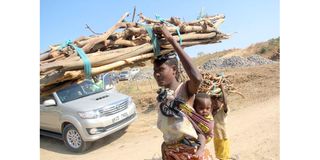Kenya bets on unpaid care policy to enhance gender equality

A woman with her children head back home after collecting firewood. Women carry the heavier burden of unpaid care and domestic work.
What you need to know:
- Kenya has identified unpaid care work as one of the barriers to achieving gender equality and women’s empowerment.
- The Kenya National Bureau of Statistics is also conducting a new study to establish the extent of unpaid care and domestic work.
Kenya is developing an unpaid care policy aimed at enhancing the gender equality and empowerment of women and girls.
The policy will be the first in the country and will bridge the gender gap when it comes to unpaid care work, which has been a major bone of contention in recent times.
Kenya has identified unpaid care work as one of the barriers to achieving gender equality and women’s empowerment.
In a move associated with the new policy, the Kenya National Bureau of Statistics (KNBS) is also conducting a new study, dubbed Time Use Survey, to establish the extent of unpaid care and domestic work.
KNBS is undertaking the inaugural survey with technical assistance from UN Women through its global flagship gender data and statistics programme dubbed Women Count.
Gender-relevant data
The survey is collecting information from individuals on what they do with their time and how they allocate it to different activities over a specified period, typically 24 hours over one or more days. The data from the survey will provide a picture of people’s daily lives and a rich source of gender-relevant information.
Both the policy and survey are aimed at creating an understanding of the extent of unpaid care and domestic work and assigning value to it for development planning, wealth generation, and nation-building.
Maureen Gitonga, programme specialist, Gender Statistics at UN Women Kenya, observes that one of the targets under Sustainable Development Goal (SDG) 5 on gender equality highlights the importance of addressing unpaid care work.
“Under this target, member states commit to recognising and valuing unpaid care and domestic work, providing the necessary infrastructure, and promoting shared responsibilities in households,” says Gitonga.
Caneble Oganga, the programme specialist, Gender Statistics Advisor, KNBS, notes that while there has been commendable progress in the past few years to produce timely, accurate, and relevant data, Kenya currently has data for only 42 of the 80 gender-related SDG indicators.
Unpaid care and domestic work is one of the areas with gender data gaps that Kenya needs to address to effectively monitor progress and report on the SDGs as well as other international and national commitments such as Kenya’s Vision 2030.
Jackline Migide, the gender technical lead at the Council of Governors (CoG), is optimistic that the survey will produce credible, relevant and statistically representative data.
This, she says, will go a long way in supporting evidence-based decision-making and advocacy on unpaid care and domestic work down to the county level.
"The data disaggregated by sex, age group and location provided through the study will be instrumental in informing policy," says Ms Migide.
As part of ongoing efforts to build capacity for gender-responsive planning and policy development, the UN Women has also partnered with the State Department for Gender, KNBS, and Oxfam to train national and county officials in unpaid care and domestic work, which are part of the care economy.
Economic impact
The training seeks to provide a deeper understanding of exactly how unpaid care and domestic work contribute to the national economy and its impact on the macro-economy. Already, more than 200 mid-level to senior officers from all 47 counties and a cross-section of line ministries have undergone training.
Studies in the region, including in Kenya, Tanzania and Uganda, show that heavy and unequal unpaid care and domestic work exclude women and girls from opportunities to engage in decent paid work, education, political life, and leisure activities thus undermining their rights.
The studies also show that women perform more than three-quarters of all unpaid care work, which is more than three times the unpaid care work carried out by men. Women globally shoulder a disproportionate amount of unpaid care and domestic work compared to men.
According to Oxfam International, two in every five or 42 per cent of women globally are outside the paid workforce because they are responsible for all the care-giving compared to six per cent of men.
Gender experts hold that gender-responsive policies are a good place to start as part of ensuring gender equality and women’s empowerment.





